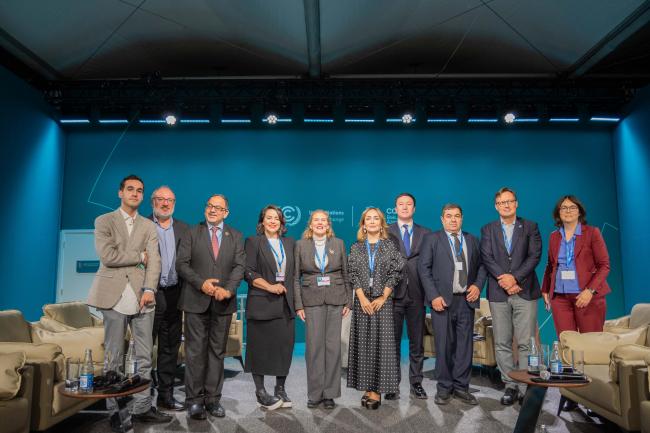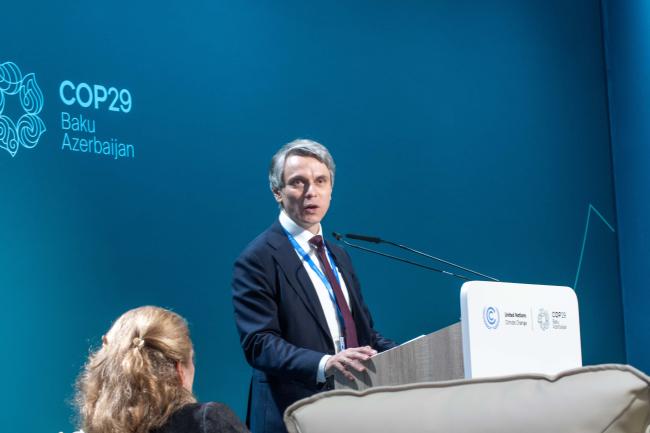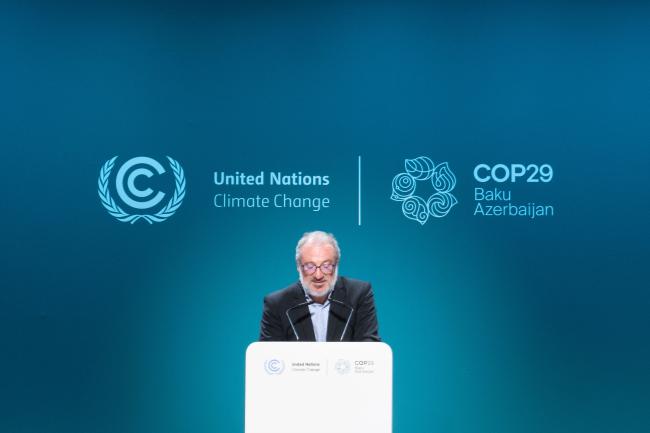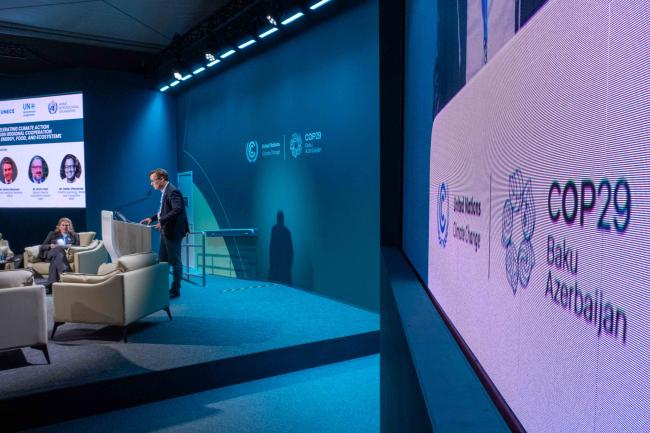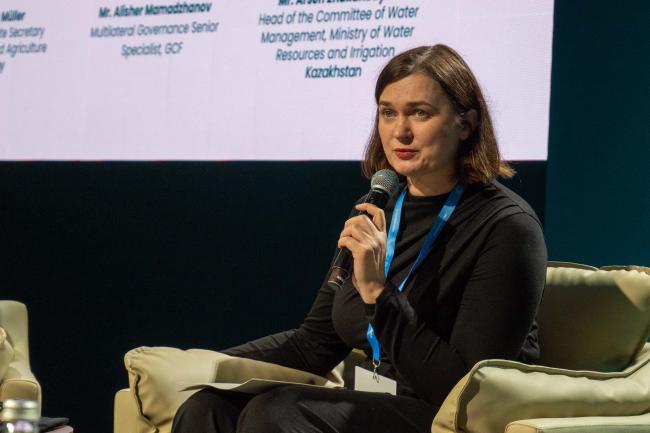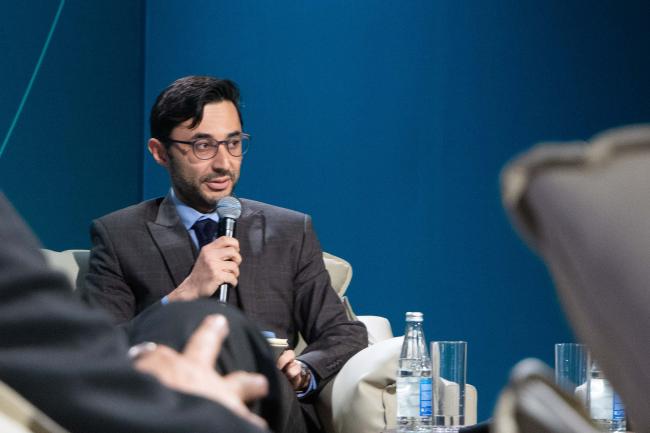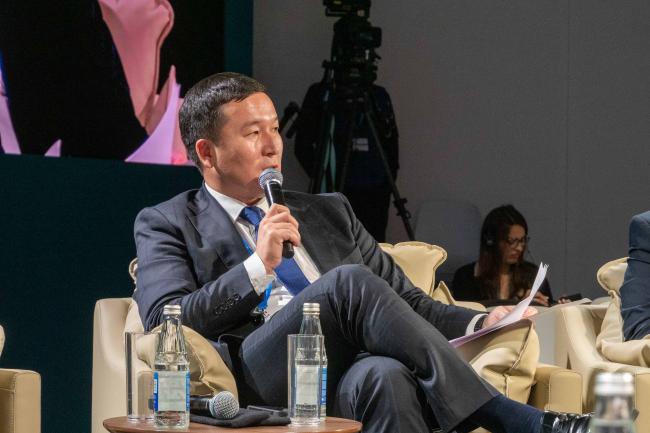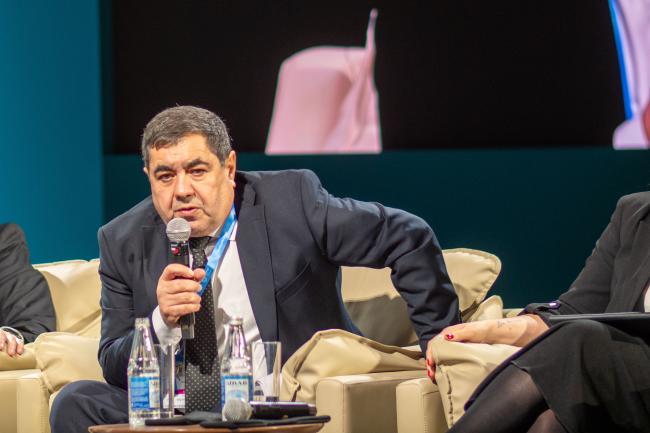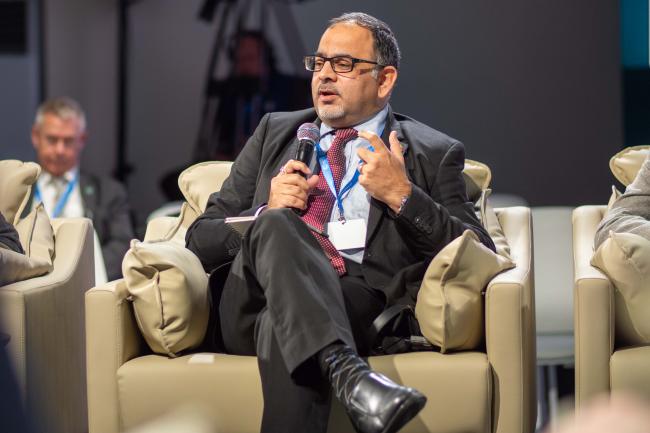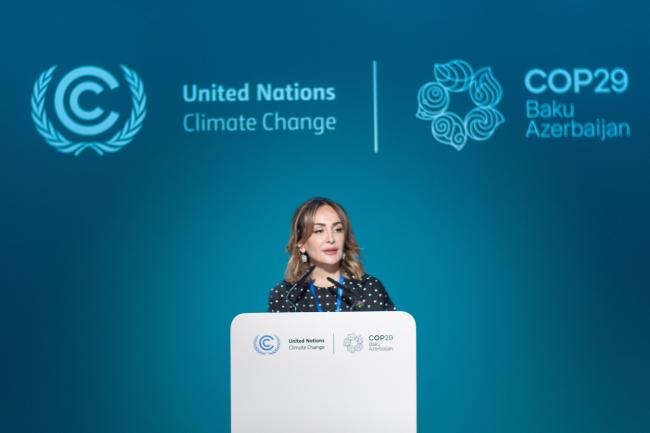About
Focusing on the interconnections between water, energy, food, and ecosystems, high-level stakeholders in the climate fight urged regional cooperation to unlock mutually reinforcing benefits for people and the environment.
Much of the impact of climate mitigation and adaptation hinges on the efficient use and wise management of water, energy, food, and ecosystems. Actions focused at the nexus of these essential elements of climate action have the potential to unlock mutually reinforcing benefits. Yet because these resources are most often transboundary in nature, regional cooperation is essential for realizing this potential.
At this event, Member States, UN organizations, and partners discussed how regional cooperation can help countries wisely manage water, energy, food, and ecosystem interlinkages.
Giovanna Valverde Stark, Ministry of Foreign Affairs, Costa Rica, moderated the event. Umayra Taghiyeva, Deputy Minister of Ecology and Natural Resources, Azerbaijan, provided opening remarks. She stressed that climate change is reshaping water, food, energy, and natural systems, which are interrelated sectors requiring “a holistic approach” if climate issues are to be addressed. She highlighted the launch of two documents – the UN-Water Analytical Brief on Water for Climate Mitigation and the Action-oriented Document on Mainstreaming Transboundary Water Management and Cooperation into NDCs and NAPs – which provide crucial insights into mitigation and adaptation actions.
Opening the first panel focusing on perspectives of regional cooperation, Viorel Gutu, Assistant Director-General and Regional Representative for Central Asia and Europe, FAO, advocated for achieving synergies in work on food, agriculture, and water to address five urgent crises related to: food security, climate change, water, energy, and nature. Gutu emphasized that solutions to these interrelated crises lie in sustainable agrifood solutions and national and regional cooperation. Gutu pointed to knowledge sharing, attracting more climate finance, and multi-stakeholder partnerships as key to achieving synergies. He also highlighted FAO-supported projects focusing on solar power and hydroponics.
Dmitry Mariyasin, Deputy Executive Secretary, UN Economic Commission for Europe (UNECE), stressed that “the world has become unpredictable,” and the climate crisis exemplifies this, with disruptions in global water cycles impacting communities, ecosystems, and supply chains. Mariyasin noted that at the same time, there is increasing competition and demand for water resources, which not only are required for drinking and agriculture, but also for climate mitigation measures such as hydropower, reforestation, and bioenergy. Mariyasin urged transboundary cooperation to optimize water use, calling on more Parties to join the Convention on the Protection and Use of Transboundary Watercourses and International Lakes (Water Convention). He concluded by noting that ecosystems are collapsing and urged protecting them.
Bruno Pozzi, UN Environment Programme (UNEP), stressed that water is the “currency you play on the board of development,” and is a limiting factor in sustainability pathways. He underscored that increasing pressures on water-related ecosystems have never been higher due to climate change and overuse. He urged integrated water management, noting that regions that monitor their water assets are in a position to take action when needed to support ecosystems. He emphasized the need for effective legal frameworks and local participation in water resource management.
Stefan Uhlenbrook, Director of Hydrology, Water and Cryosphere, World Meteorological Organization (WMO), reiterated the interconnections between water, food, energy, and ecosystems, which were demonstrated by Western Europe’s severe drought of 2022. The drought, he said, impacted food security, aquatic ecosystems, and nuclear power plants, which rely on water for cooling. Uhlenbrook urged data sharing and regional cooperation, which is difficult due to governments’ reluctance to share information about their water resources. Uhlenbrook noted shared methodologies for calculating data can produce agreed-upon products that can be shared to help manage water, build resilience, and address the challenge of climate change.
In a second panel on lessons learned from cross-sectoral cooperation, Claudia Müller, Ministry of Food and Agriculture, Germany, called for regional and cross-sectoral cooperation that considers the interdependencies of sectors, namely both synergies and tradeoffs. She said collaboration is key to preserving security and stability in relation to transboundary natural resources, noting awareness of international water policies is rising following the UN 2023 Water Conference. Finally, she called for more Parties to join FAO’s Global Dialogue on Water Tenure, which promotes responsible governance of water resources.
Alisher Mamadzhanov, Global Climate Fund (GCF), said water security is a priority for the GCF, which, thus far, has mobilized USD 3 billion for 41 projects in 64 countries. Calling for greater regional and multisectoral approaches, he underscored the Water Convention as a useful framework to encourage transboundary cooperation. He also commended Azerbaijan for submitting its first National Adaptation Plan(NAP) to the UNFCCC, in partnership with UNEP and the GCF.
Arsen Zhakanbayev, Ministry of Water Resources and Irrigation, Kazakhstan, described the climate impacts faced by his country, including decreasing water resources. As a result, he said agricultural yield is reduced, which in turn has social and economic impacts. Stressing the need to enhance the efficiency of water resource management at the national and regional levels, he described initiatives such as using irrigation to restore riverbed ecosystems.
Reporting on how the 2013-2014 Water-Food-Energy Nexus Assessment was carried out in the Alazani/Ganizh river basin between Georgia and Azerbaijan, Rafig Verdiyev, Ministry of Ecology and Natural Resources, Azerbaijan, described the history of this collaboration, which began with the sharing of data and concerns.
Nika Gogatishvili, Ministry of Environmental Protection and Agriculture, Georgia, then highlighted changes in legal frameworks that have improved water management in his country. He noted that flooding due to melting glaciers is causing social and economic disruptions and that Georgia is working on river management plans and more regional cooperation.
Gisele Bortolini, Ministry of Development and Social Assistance, Family and Fight Against Hunger, Brazil, urged radical change in food systems, emphasizing that it is impossible to face climate change without addressing social and economic inequalities. She noted new domestic policies in Brazil that are improving food security and integrating food and water into national adaptation and mitigation plans.
Vinay Nangia, International Center for Agricultural Research in Dry Areas,CGIAR, urged approaching water resources as a matter of equality for people both upstream and downstream, not only in terms of supply but also in terms of quality and timing. He urged fair treaties on transboundary water resources that can withstand the test of time. “Why should ordinary people suffer because they are located downstream?” he asked.
Closing the event, Nigar Mammadova, Member of Parliament, Azerbaijan, highlighted the interdependence of water and agriculture, which is critical to security. She urged innovative approaches to sustainable water management and treating water as a fundamental right. Mammadova underscored that the COP 29 Peace and Climate Initiative should “become a symbol of human solidarity.”
Organizers: COP 29 Presidency, UNECE, WMO and UNEP
Contact: Hanna Plotnykova | hanna.plotnykova@un.org
To receive free coverage of global environmental events delivered to your inbox, subscribe to the ENB Update newsletter.
All ENB photos are free to use with attribution. For 2024 UN Climate Change Conference Baku - Side Events, please use: Photo by IISD/ENB | Andrés Felipe Carvajal Gómez

